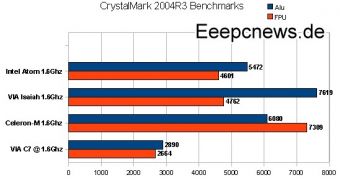The upcoming ultra-mobile PC offerings will be powered by either VIA's low-voltage Isaiah processor or by Intel's Atom chip. Those of you who are wondering which one delivers the best bang per buck can now get an overview of the two chips' performance.
The benchmark was conducted by the German tech website Eee PC News using an Intel Atom processor clocked at 1.6GHz and a VIA Isaiah/CN processor, clocked at the same core speed of 1.6GHz. In order to make things funnier, the benchmarkers also compared the results to an 1.6 GHz Celeron-M and an 1.6GHz VIA C7 chip.
All the four processors have been tested using the CrystalMark 2004R3 benchmarking software, but the final results only include the CPU ALU and FPU numbers.
Incredibly enough, VIA's statement about Isaiah being twice as fast as the old and weary C7-M chip were accurate. The Isaiah processor managed to achieve more than twice the performance of the former C7-M.
More than that, VIA's Isaiah scored more points in the FPU benchmark even as compared to the Celeron-M processor. The lightweight Isaiah made it through the test with 7619 points, which is 1539 points more than Celeron's final score of 6080.
The ALU scores are also a surprise, given the fact that VIA's Isaiah seems to outperform the Atom all-in-one-wonder chip. Despite the fact that the Atom chip achieved 4,601 points, VIA's Isaiah/CN processor is still leading with a total score of 4,762. This might not be as impressive as the FPS score, but still it proves VIA's supremacy on the low-voltage CPU market.
The rest of the benchmark test is still a mystery, but if the scores are similar across the entire tests, VIA's future on the ultra-mobile market is painted in bright colors.
However, there is yet another big issue that needs addressing before jumping to the final conclusions: pricing. Although Intel hinted at the ultra-low manufacturing costs for its low-energy chips, there is no clue about the final retail prices. VIA is also keeping prices wrapped up, which makes the comparison even harder.
If VIA manages to keep a reasonable price per 1,000-tray units, it might eventually succeed in imposing a new trend on the UMPC market, a trend that started with the advent of HP's state-of-the-art 2133 Mini-Note PC.

 14 DAY TRIAL //
14 DAY TRIAL //